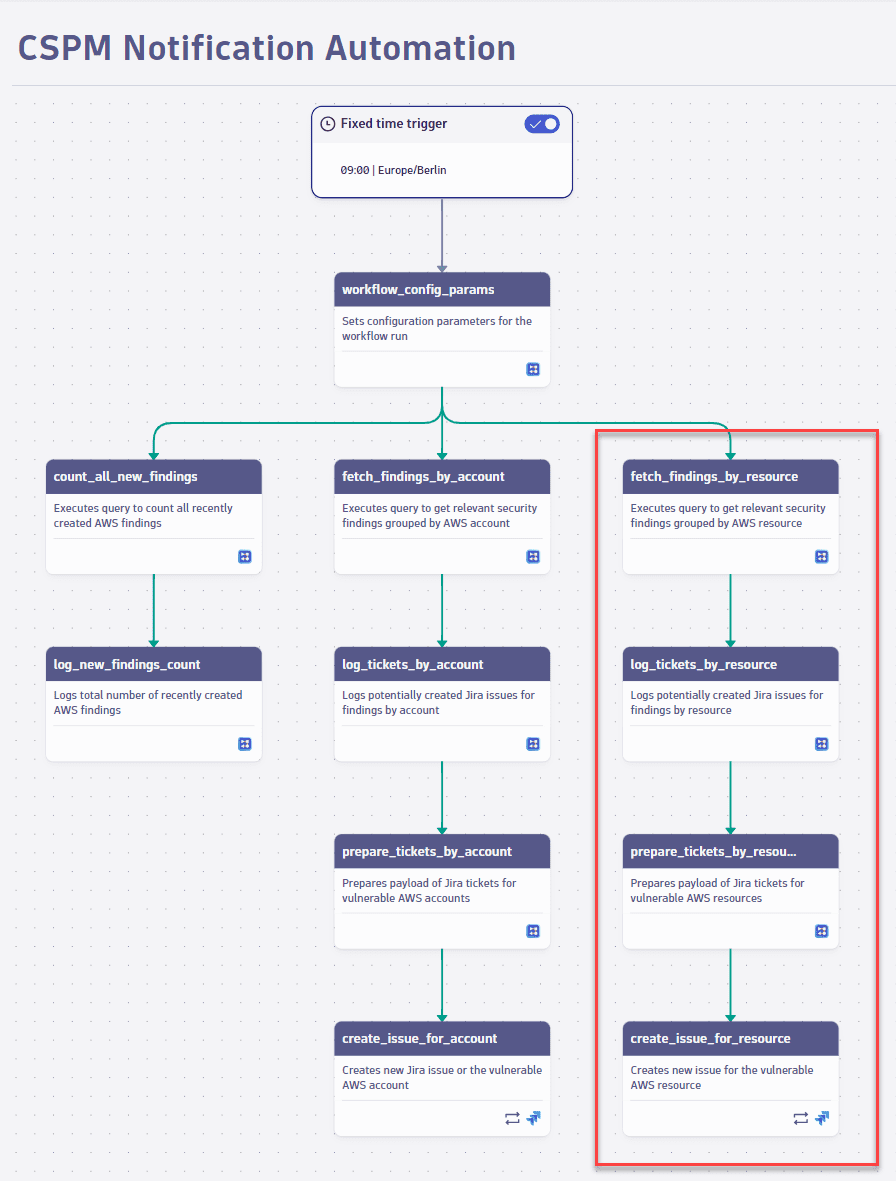CSPM Notification Automation
- Latest Dynatrace
- Tutorial
Early Adopter
Hyperscalers provide offerings such as AWS Security Hub, through which security-related events give insights into potential threats. These events must be triaged, analyzed, and remediated by the owners of the affected resources, and reaching hundreds of thousands of such alerts is common.
- The volume of these events currently means that not all can get the attention they deserve.
- Because ownership of resources is distributed, significant coordination and administrative effort is required to ensure that all events are acted upon.
Dynatrace addresses these concerns and improves your cloud security posture management (CSPM) by introducing an automation workflow that filters security findings stored in Grail and triggers alerts only for the events that matter.
Target audience
This page is intended for Security teams analyzing security findings.
Scenario
In the following, we address a scenario in which 400,000 AWS alerts are issued daily.
Manually dealing with all of them is simply infeasible. The Security team therefore has to focus only on high-priority events and has built custom tooling to partially automate Jira ticket creation.
- Within a year, nearly 1,100 security tickets have been manually created from those events.
- Investigating those tickets has involved about 300 people gathering additional information to analyze the situation.
Effort is sometimes invested in vain, and alerts turn out to be irrelevant, but the resource owner must always cross-check the resolution with the Security team. Ensuring that all are followed up on requires a significant coordination effort, leaving less time for actual security work.
Request
- The team wants to be able to explore all data but receive notifications (tickets) only for critical or high events and only for certain relevant AWS accounts.
- Notifications should include the alert type, full context, relevant details, and remediation advice to enable understanding, actionability, and operationalization.
- Only the account owner should be informed of the issue (tickets should be automatically assigned to him).
- The team doesn't want to be spammed with multiple notifications for the same issue, so there shouldn't be any duplicate tickets.
Goal
Efficiency: The team should be able to act on everything that matters immediately.
Result
Dynatrace CSPM Notification Automation is a tool designed to answer the Security team's pain and improve their efficiency significantly. It allows the team to continue monitoring events without being burdened with alerts; they can now focus only on what matters and requires their security expertise.
More concretely, from a total of 400,000 alerts per day, of which just 40,000 are relevant, with Dynatrace CSPM Notification Automation, only a couple of Jira tickets are now created daily, just for the relevant issues.
How it works
Dynatrace CSPM Notification Automation consists of two stages.
- (Prerequisite) AWS security findings from AWS Security Hub are ingested into Grail by means of Dynatrace log ingestion.
- (Actual automation) A predefined workflow orchestrates the processes of querying, filtering, and grouping data and converts the resulting findings into Jira tickets for remediation. See Get started for the workflow steps.

Prerequisites
See below for the AWS and Dynatrace requirements.
AWS requirements
- Set up AWS accounts for which you want to receive notifications.
- Set up AWS Security Hub (collects AWS security findings).
Dynatrace requirements
- Dynatrace version 1.276+
- Set up log ingestion (ingests AWS security findings into Grail).
- Set up Jira Connector (allows the workflow to convert resulting findings into Jira tickets).
- Make sure the following permissions are enabled.
-
Grail:
storage:logs:read. For instructions, see Assign permissions in Grail. -
 Workflows: Permissions to access, view, write, and execute workflows. For details, see Authorization.
Workflows: Permissions to access, view, write, and execute workflows. For details, see Authorization.To access permissions, go to the Settings menu in the upper-right corner of
 Workflows and select Authorization settings.
Workflows and select Authorization settings.
-
Get started
Once your AWS security findings are ingested into Grail (see Prerequisites), you can set up the CSPM Notification Automation workflow.
The workflow consists of several steps you can adapt according to your needs. To configure it, you can start by importing a prefilled workflow into your environment.
1. Import workflow
-
Copy and save the JSON file below.
{"id": "dcce961d-26a9-46e6-a9e4-14a0f7f2185c","title": "CSPM Notification Automation","description": "","tasks": {"count_all_new_findings": {"name": "count_all_new_findings","description": "Executes query to count all recently created AWS findings","action": "dynatrace.automations:execute-dql-query","active": true,"input": {"query": "fetch logs, from:now() - 24h, scanLimitGBytes: -1\n| filter aws.log_group == \"/aws/events/AWSSecurityHubLogGroup\"\n| fields timestamp\n| filter timestamp > now() - 24h // Only filter created since last successful run \n| summarize { count=count() }"},"position": {"x": -1,"y": 2},"predecessors": ["workflow_config_params"],"conditions": {"states": {"workflow_config_params": "OK"}}},"log_new_findings_count": {"name": "log_new_findings_count","description": "Logs total number of recently created AWS findings","action": "dynatrace.automations:run-javascript","active": true,"input": {"script": "import { execution } from '@dynatrace-sdk/automation-utils';\n\nexport default async function ({ executionId }) {\n\n const ex = await execution(executionId);\n const countResult = await ex.result(\"count_all_new_findings\");\n\n console.log('======================================================================')\n console.log('Total findings added since last run: ')\n console.log(countResult.records[0].count)\n console.log('')\n}"},"position": {"x": -1,"y": 3},"predecessors": ["count_all_new_findings"],"conditions": {"states": {"count_all_new_findings": "OK"}}},"log_tickets_by_account": {"name": "log_tickets_by_account","description": "Logs potentially created Jira issues for findings by account","action": "dynatrace.automations:run-javascript","active": true,"input": {"script": "import { execution } from '@dynatrace-sdk/automation-utils';\n\nexport default async function ({ executionId }) {\n const ex = await execution(executionId);\n const by_control_id = await ex.result(\"fetch_findings_by_account\");\n\n console.log('=================================================================================================')\n console.log(`Issues by accounts, ${by_control_id.records.length} findings`)\n console.log('=================================================================================================')\n\n for(let finding of by_control_id.records) {\n console.log('')\n console.log('=================================================================================================')\n console.log(`Automatic Vulnerability Report for ${finding.controlId} - AWS account ${finding.awsAccountId}`)\n console.log('=================================================================================================')\n console.log('')\n console.log('The following vulnerabilities were reported for your account via AWS Security Hub.')\n console.log('')\n console.log(`AWS Account: ${finding.awsAccountId}`)\n console.log('')\n console.log('Vulnerability:')\n console.log(`${finding.controlId} - ${finding.title}`)\n console.log(finding.severity)\n console.log(finding.description)\n console.log(finding.remediation[0].Recommendation.Url)\n console.log('')\n console.log('Affected resources:')\n for(let resource of finding.resources) {\n console.log(resource)\n }\n console.log('') \n console.log('=================================================================================================')\n console.log('')\n console.log('')\n }\n \n return by_control_id.records;\n}"},"position": {"x": 0,"y": 3},"predecessors": ["fetch_findings_by_account"],"conditions": {"states": {"fetch_findings_by_account": "OK"}}},"workflow_config_params": {"name": "workflow_config_params","description": "Sets configuration parameters for the workflow run","action": "dynatrace.automations:run-javascript","input": {"script": "// This step sets up some configurational parameters for the workflow run \n// (e.g. which accounts, which finding types we are filtering for)\nexport default async function () {\n\n // AWS accounts to filter for\n const awsAccountIds = [\n // add your AWS account ids here, e.g.\n // \"1234567890\"\n ]\n\n // Findings that should be grouped by AWS account\n const securityControlIdsToGroupByAccount = [\n // add you control IDs here, e.g.\n // \"S3.1\" // S3 Block Public Access setting should be enabled\n ]\n\n // Findings that should be grouped by AWS Resource\n const securityControlIdsToGroupByResource = [\n // add you control IDs here, e.g.\n // \"EC2.13\" // Security groups should not allow ingress from 0.0.0.0/0 to port 22\n ]\n \n return { awsAccountIds, securityControlIdsToGroupByAccount, securityControlIdsToGroupByResource }\n}"},"position": {"x": 0,"y": 1},"predecessors": []},"log_tickets_by_resource": {"name": "log_tickets_by_resource","description": "Logs potentially created Jira issues for findings by resource","action": "dynatrace.automations:run-javascript","active": true,"input": {"script": "import { execution } from '@dynatrace-sdk/automation-utils';\n\nexport default async function ({ executionId }) {\n const ex = await execution(executionId);\n const by_resource = await ex.result(\"fetch_findings_by_resource\");\n\n console.log('=================================================================================================')\n console.log(`Issues by resource, ${by_resource.records.length} findings`)\n console.log('=================================================================================================')\n\n for(let finding of by_resource.records) {\n console.log('')\n console.log('=================================================================================================')\n console.log(`Automatic Vulnerability Report for ${finding.resource.resourceId}`)\n console.log('=================================================================================================')\n console.log('')\n console.log('The following vulnerabilities were reported for your resource via AWS Security Hub.')\n console.log('')\n console.log(`AWS Account: ${finding.aws.accountId}`)\n console.log('')\n console.log('Resource details:')\n console.log(finding.resource.resourceType)\n console.log(finding.resource.resourceId)\n console.log('')\n console.log('Vulnerabilities:')\n for(let vulnerability of finding.vulnerabilities) {\n console.log(`${vulnerability.controlId} - ${vulnerability.title}`)\n console.log(vulnerability.severity)\n console.log(vulnerability.description)\n console.log(vulnerability.remediation[0].Recommendation.Url) \n }\n console.log('=================================================================================================')\n console.log('')\n console.log('')\n }\n \n return by_resource.records;\n}"},"position": {"x": 1,"y": 3},"predecessors": ["fetch_findings_by_resource"],"conditions": {"states": {"fetch_findings_by_resource": "OK"}}},"create_issue_for_account": {"name": "create_issue_for_account","description": "Creates new Jira issue or the vulnerable AWS account","action": "dynatrace.jira:jira-create-issue","active": false,"input": {"labels": [],"summary": "{{ _.item.summary }}","components": [],"description": "{{ _.item.description }}","fieldSetters": []},"position": {"x": 0,"y": 5},"predecessors": ["prepare_tickets_by_account"],"conditions": {"states": {"prepare_tickets_by_account": "OK"}},"concurrency": 1,"withItems": "item in {{result(\"prepare_tickets_by_account\")}}"},"create_issue_for_resource": {"name": "create_issue_for_resource","description": "Creates new issue for the vulnerable AWS resource","action": "dynatrace.jira:jira-create-issue","active": false,"input": {"labels": [],"summary": "{{ _.item.summary }}","components": [],"description": "{{ _.item.description }}","fieldSetters": []},"position": {"x": 1,"y": 5},"predecessors": ["prepare_tickets_by_resource"],"conditions": {"states": {"prepare_tickets_by_resource": "OK"}},"concurrency": 1,"withItems": "item in {{result(\"prepare_tickets_by_resource\")}}"},"fetch_findings_by_account": {"name": "fetch_findings_by_account","description": "Executes query to get relevant security findings grouped by AWS account","action": "dynatrace.automations:execute-dql-query","active": true,"input": {"query": "fetch logs, from:now() - 24h, scanLimitGBytes: -1\n| filter aws.log_group == \"/aws/events/AWSSecurityHubLogGroup\"\n| parse content, \"JSON:alert\"\n| fields timestamp,\n awsRegion = toString(alert[detail][findings][0][Region]),\n awsAccountId = toString(alert[detail][findings][0][AwsAccountId]),\n resourceType = toString(alert[detail][findings][0][Resources][0][Type]), \n resource = toString(alert[detail][findings][0][Resources][0][Id]),\n alertType = toString(alert[detail][findings][0][Types][0]),\n id = toString(alert[detail][findings][0][Id]),\n severity = toString(alert[detail][findings][0][FindingProviderFields][Severity][Label]),\n title = toString(alert[detail][findings][0][Title]),\n description = toString(alert[detail][findings][0][Description]),\n complianceStatus = toString(alert[detail][findings][0][Compliance][Status]),\n controlId = toString(alert[detail][findings][0][Compliance][SecurityControlId]),\n remediation = alert[detail][findings][0][Remediation],\n created = toTimestamp(alert[detail][findings][0][CreatedAt]),\n lastObservedAt = toTimestamp(alert[detail][findings][0][LastObservedAt])\n| filter in(severity, array(\"HIGH\", \"CRITICAL\", \"MEDIUM\"))\n| filter created > now() - 24h\n| filter in(awsAccountId, array(\"{{ result('workflow_config_params').awsAccountIds | join('\",\"') }}\"))\n| filter in(controlId, array(\"{{ result('workflow_config_params').securityControlIdsToGroupByAccount | join('\",\"') }}\"))\n| summarize { count=count(),\n lastObservedAt = max(lastObservedAt),\n remediation = collectDistinct(remediation),\n complianceStatus = takeLast(complianceStatus),\n resources = collectDistinct(resource),\n title = takeAny(title),\n description = takeAny(description),\n severity = takeAny(severity),\n awsRegion = collectArray(awsRegion)\n },\n by:{\n controlId, \n awsAccountId\n }\n| lookup\n [ fetch dt.entity.aws_credentials \n | fields awsAccountId, entity.name\n ], lookupField:awsAccountId, sourceField:awsAccountId, prefix: \"aws.account.\"\n"},"position": {"x": 0,"y": 2},"predecessors": ["workflow_config_params"],"conditions": {"states": {"workflow_config_params": "OK"}}},"fetch_findings_by_resource": {"name": "fetch_findings_by_resource","description": "Executes query to get relevant security findings grouped by AWS resource","action": "dynatrace.automations:execute-dql-query","active": true,"input": {"query": "fetch logs, from:now() - 24h, scanLimitGBytes: -1\n| filter aws.log_group == \"/aws/events/AWSSecurityHubLogGroup\"\n| parse content, \"JSON:alert\"\n| fields timestamp,\n awsRegion = toString(alert[detail][findings][0][Region]),\n awsAccountId = toString(alert[detail][findings][0][AwsAccountId]),\n resourceType = toString(alert[detail][findings][0][Resources][0][Type]), \n resourceId = toString(alert[detail][findings][0][Resources][0][Id]),\n alertType = toString(alert[detail][findings][0][Types][0]),\n id = toString(alert[detail][findings][0][Id]),\n severity = toString(alert[detail][findings][0][FindingProviderFields][Severity][Label]),\n title = toString(alert[detail][findings][0][Title]),\n description = toString(alert[detail][findings][0][Description]),\n complianceStatus = toString(alert[detail][findings][0][Compliance][Status]),\n controlId = toString(alert[detail][findings][0][Compliance][SecurityControlId]),\n remediation = alert[detail][findings][0][Remediation],\n created = toTimestamp(alert[detail][findings][0][CreatedAt]),\n lastObservedAt = toTimestamp(alert[detail][findings][0][LastObservedAt])\n| filter in(severity, array(\"HIGH\", \"CRITICAL\", \"MEDIUM\"))\n| filter created > now() - 24h\n| filter in(awsAccountId, array(\"{{ result('workflow_config_params').awsAccountIds | join('\",\"') }}\"))\n| filter in(controlId, array(\"{{ result('workflow_config_params').securityControlIdsToGroupByResource | join('\",\"') }}\"))\n| summarize { count=count(),\n lastObservedAt = max(lastObservedAt),\n remediation = collectDistinct(remediation),\n complianceStatus = takeLast(complianceStatus)\n },\n by:{\n alertType, \n resourceType, \n controlId, \n title,\n description, \n severity, \n resourceId, \n awsAccountId,\n created,\n awsRegion\n }\n| lookup\n [ fetch dt.entity.aws_credentials \n | fields id, awsAccountId, entity.name, tags, awsNameTag\n ], lookupField:awsAccountId, sourceField:awsAccountId, prefix: \"aws.account.\"\n| fields aws = record(\n accountId = awsAccountId,\n name = aws.account.entity.name,\n entity = aws.account.id\n ), \n resource = record(\n resourceId = resourceId,\n resourceType = resourceType\n ),\n region = awsRegion,\n alert = record(controlId = controlId, \n severity = severity, \n complianceStatus = complianceStatus,\n title = title,\n description = description,\n remediation = remediation\n )\n| summarize {\n count=count(),\n vulnerabilities = collectDistinct(alert)\n },\n by:{\n aws,\n resource,\n region\n }"},"position": {"x": 1,"y": 2},"predecessors": ["workflow_config_params"],"conditions": {"states": {"workflow_config_params": "OK"}}},"prepare_tickets_by_account": {"name": "prepare_tickets_by_account","description": "Prepares payload of Jira tickets for vulnerable AWS accounts","action": "dynatrace.automations:run-javascript","active": true,"input": {"script": "import { execution } from '@dynatrace-sdk/automation-utils';\n\nexport default async function ({ executionId }) {\n const ex = await execution(executionId);\n const records = await ex.result(\"log_tickets_by_account\");\n\n console.log(`${records.length} Tickets will be created!`)\n const result = [];\n for (const finding of records) {\n console.log('------------------------------------- NEW TICKET -------------------------------------')\n const resourcesList = finding.resources\n .map( resource => `|${resource}|` )\n .join('\\n')\n const ticket = {\n summary: `Automatic Vulnerability Report for ${finding.controlId} - AWS Account ${finding.awsAccountId}`,\n description: 'The following vulnerabilities were reported for your resource via AWS Security Hub:\\n\\n'\n + '*AWS Account*:\\n'\n + '||AWS Account Id||\\n'\n + `|${finding.awsAccountId}|\\n\\n`\n + '*Vulnerability*:\\n'\n + '||Id||Sev||Title||Description||Remediation Url||\\n'\n + `|{noformat}${finding.controlId}{noformat}|{noformat}${finding.severity}{noformat}|${finding.title}|${finding.description}|[${finding.remediation[0].Recommendation.Url}]|\\n\\n`\n + '*Affected Resources*:\\n'\n + '||Resource Id||\\n'\n + resourcesList\n + '\\n\\n---\\nAutomatically generated by CSPM Notification Automation'\n }\n console.log(JSON.stringify(ticket))\n result.push(ticket)\n }\n\n return result;\n}"},"position": {"x": 0,"y": 4},"predecessors": ["log_tickets_by_account"],"conditions": {"states": {"log_tickets_by_account": "OK"}}},"prepare_tickets_by_resource": {"name": "prepare_tickets_by_resource","description": "Prepares payload of Jira tickets for vulnerable AWS resources","action": "dynatrace.automations:run-javascript","active": true,"input": {"script": "import { execution } from '@dynatrace-sdk/automation-utils';\n\nexport default async function ({ executionId }) {\n const ex = await execution(executionId);\n const records = await ex.result(\"log_tickets_by_resource\");\n\n console.log(`${records.length} Tickets will be created!`)\n const result = [];\n for (const finding of records) {\n console.log('------------------------------------- NEW TICKET -------------------------------------')\n const vulnerabilitiesList = finding.vulnerabilities\n .map( vuln => \n `|{noformat}${vuln.controlId}{noformat}|{noformat}${vuln.severity}{noformat}|${vuln.title}|${vuln.description}|[${vuln.remediation[0].Recommendation.Url}]|`)\n .join('\\n')\n const ticket = {\n summary: `Automatic Vulnerability Report for ${finding.resource.resourceId}`,\n description: 'The following vulnerabilities were reported for your resource via AWS Security Hub:\\n\\n'\n + '*AWS Account*:\\n'\n + '||AWS Account Id||\\n'\n + `|${finding.aws.accountId}|\\n\\n`\n + '*Resource Details*:\\n'\n + '||Resource Type||Resource Id||\\n'\n + `|${finding.resource.resourceType}|${finding.resource.resourceId}|\\n\\n`\n + '*Vulnerabilities*:\\n'\n + '||Id||Sev||Title||Description||Remediation Url||\\n'\n + vulnerabilitiesList\n + '\\n\\n---\\nAutomatically generated by CSPM Notification Automation'\n }\n console.log(JSON.stringify(ticket))\n result.push(ticket)\n }\n\n return result;\n}"},"position": {"x": 1,"y": 4},"predecessors": ["log_tickets_by_resource"],"conditions": {"states": {"log_tickets_by_resource": "OK"}}}},"ownerType": "USER","isPrivate": false,"trigger": {"schedule": {"rule": null,"trigger": {"type": "time","time": "09:00"},"timezone": "Europe/Berlin","isActive": true,"isFaulty": false,"nextExecution": "2023-10-03T07:00:00.000Z","filterParameters": {"earliestStart": "2023-09-25"},"inputs": {}}},"schemaVersion": 3} -
In
 Workflows, select Upload and upload the file.
Workflows, select Upload and upload the file.
2. Set the time
Fixed time trigger: Sets the time when you want the workflow to run (in the current case, the workflow runs every day at 9:00 AM). See Schedule workflows for more information on scheduling a workflow.
Show me the relevant workflow task
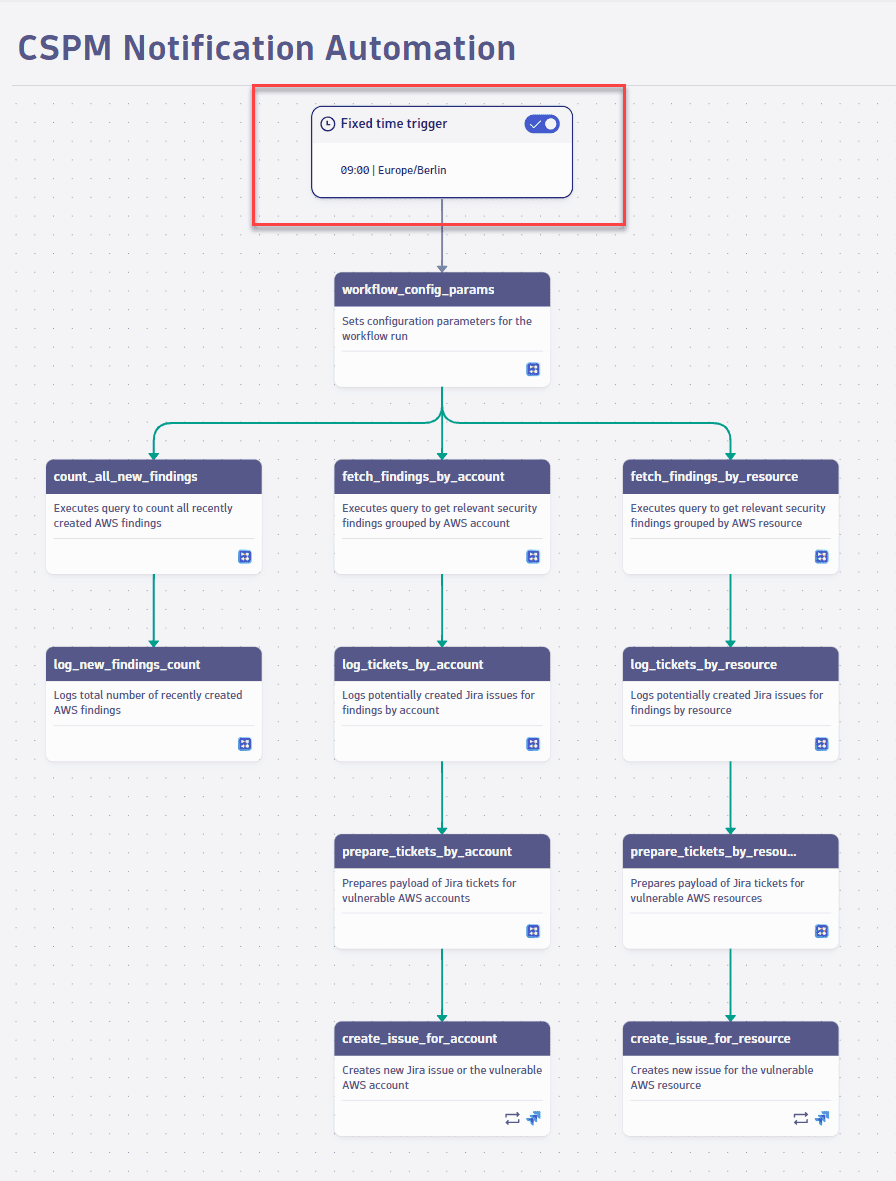
3. Define parameters
Workflow config params: Determines what findings you want to filter for. In the current scenario, the team wants to
- Receive notifications only about findings from important AWS accounts while discarding those from other accounts, such as environments that aren't in production.
- Under
awsAccountIds, select which AWS accounts you want to get findings for.
- Under
- Group findings for specific security control IDs into one ticket per AWS account.
- Under
securityControlIdsToGroupByAccount, select which security control IDs you want to group by AWS account.
- Under
- Group findings for specific security control IDs into one ticket per AWS resource.
- Under
securityControlIdsToGroupByResource, select which security control IDs you want to group by AWS resource.
- Under
Show me the relevant workflow task
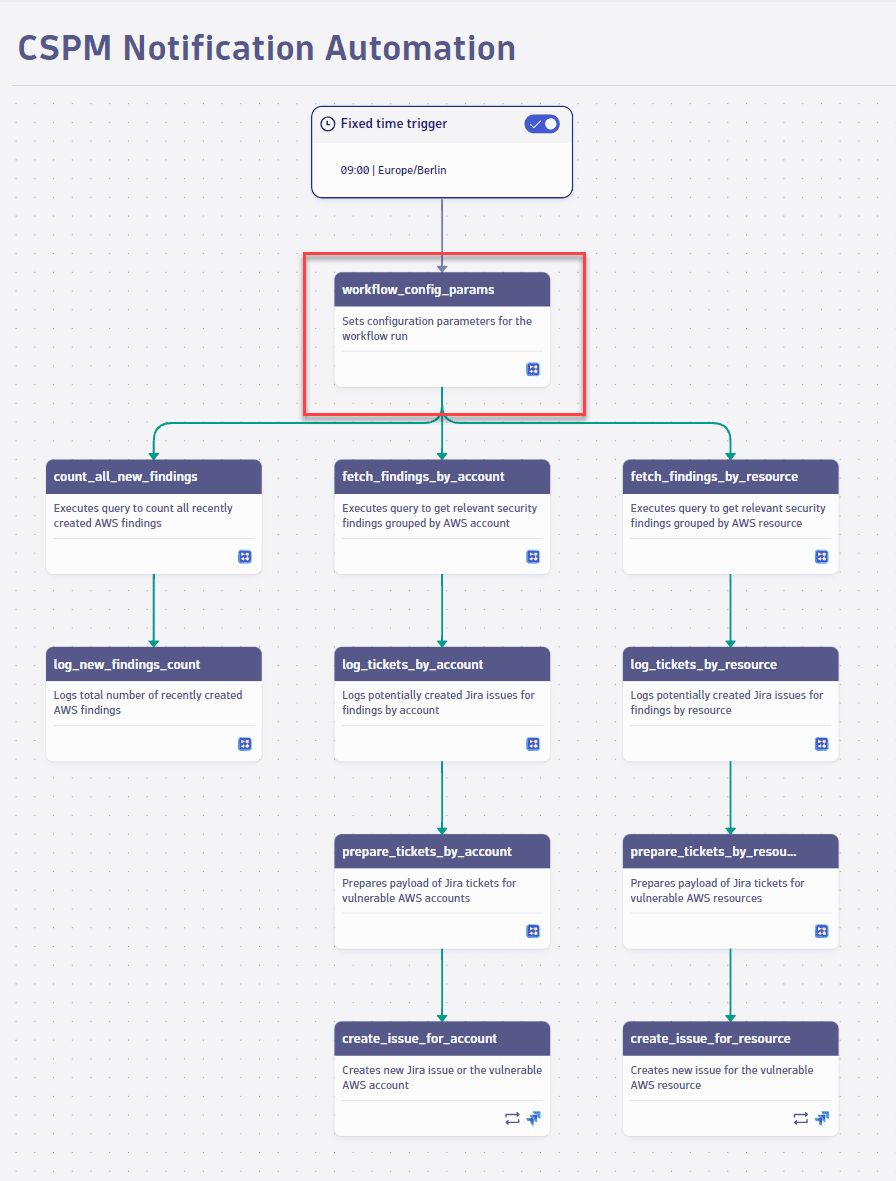
4. Orchestrate findings
The following task sequence orchestrates grouping and converting the resulting findings into one ticket per AWS account.
-
Fetch findings by account: Executes the DQL query that fetches the findings. Some of the information fetched for the current case, to be displayed in Jira, includes
- Number of findings for the respective account
- Issue title, including the security control IDs and the AWS account name
- Short description of the vulnerabilities
- Link to AWS for how to remediate the vulnerabilities
- List of affected AWS resources
-
Log tickets by account: Shows a ticket's potential content before one is automatically created. This step ensures that your configuration is correct. For details, see Plot statistics before creating tickets.
-
Prepare tickets by account: Configures the payload for the Jira ticket.
-
Create issues for account: Integrates with your Jira connection. In Input, select your Jira connection created in Prerequisites and enter the desired parameters of the Jira ticket.
Show me the relevant workflow task sequence
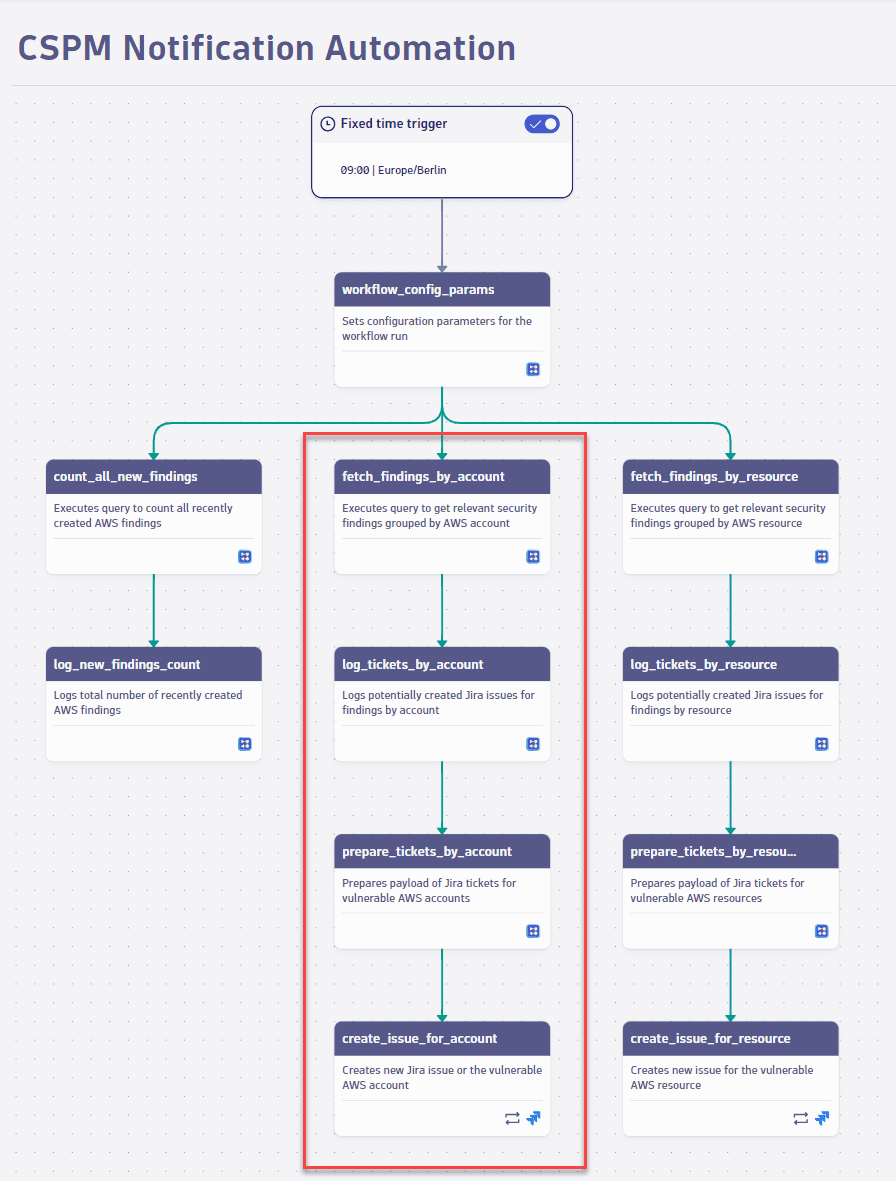
5. Display statistics
The following task sequence displays a count of the new findings since the last workflow run.
- Count all new findings: Executes the DQL query that fetches the number of findings created by AWS Security Hub in the last 24 hours.
- Log new findings count: Displays the query result.
Show me the relevant workflow task sequence
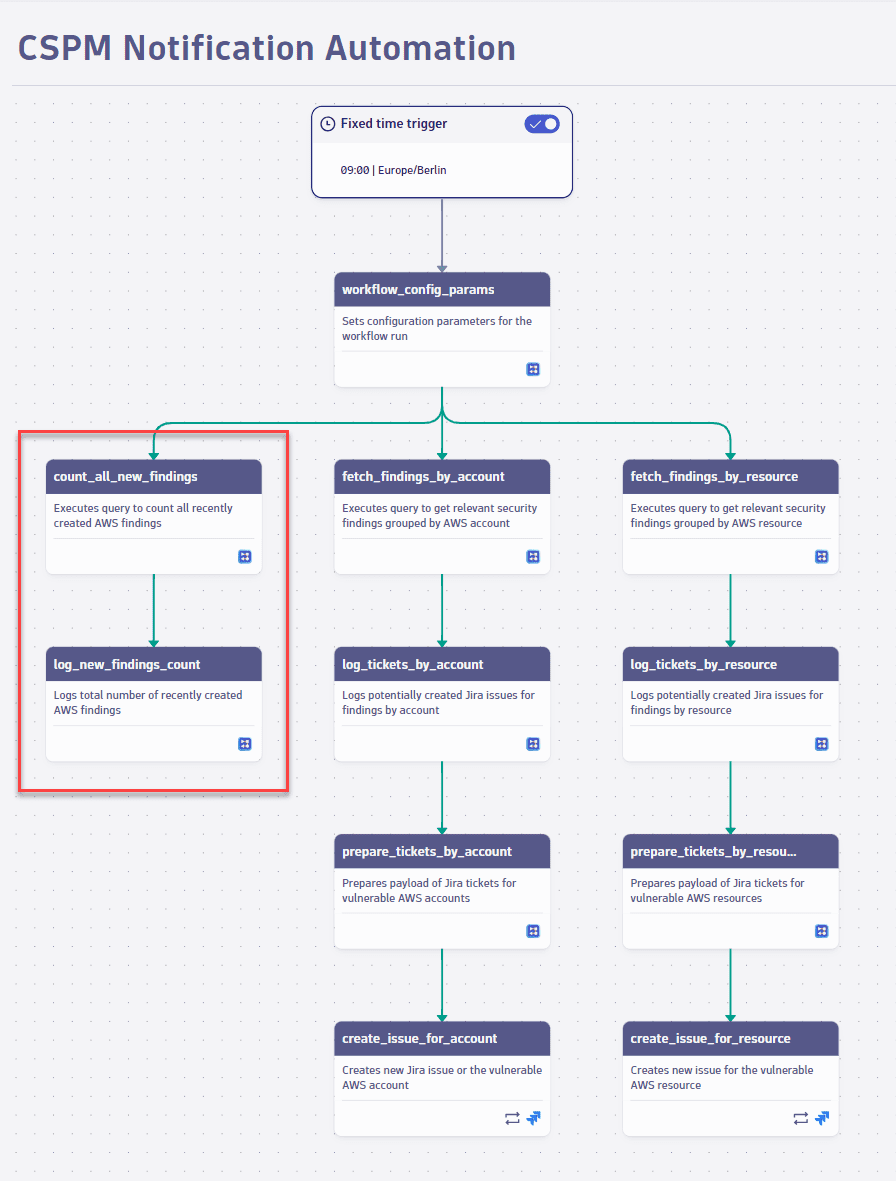
Once you're done configuring the workflow, select Save.
Plot statistics before creating tickets
To test your configuration before sending Jira tickets
- Disable the Prepare tickets by account/resource and Create issues for account/resource tasks.
Show me the relevant workflow task sequences
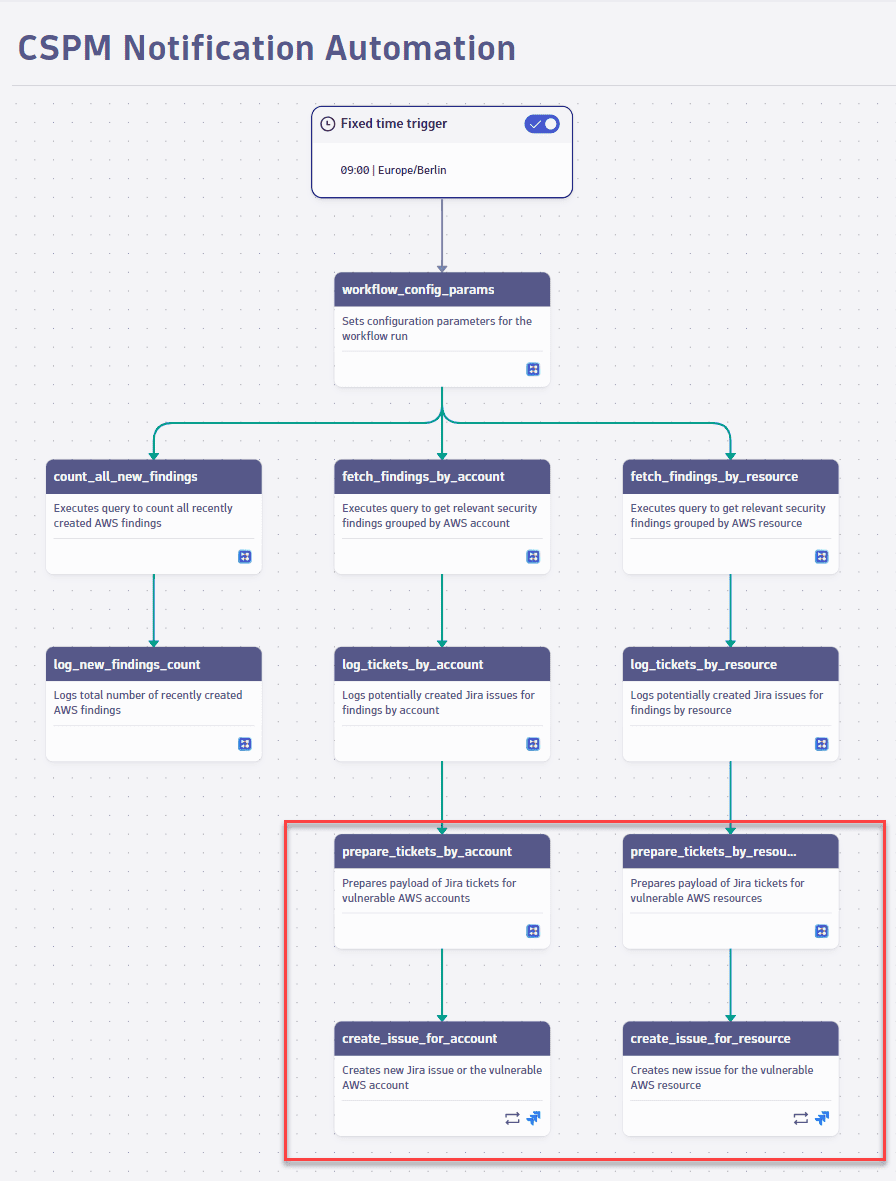
For instructions on disabling a task, see Disable or enable a task.
- Run the workflow or execute individual tasks for which you want to check the output. For instructions, see Run and monitor workflows.
Smart security
Congratulations! You’ve now set up an automation that empowers your security team. With Dynatrace CSPM Notification Automation, critical events are streamlined, alert fatigue is minimized, and cloud security is enhanced. Efficiency unleashed!
Further resources
The following is a tutorial by the internal customer of Dynatrace CSPM Notification Automation.
